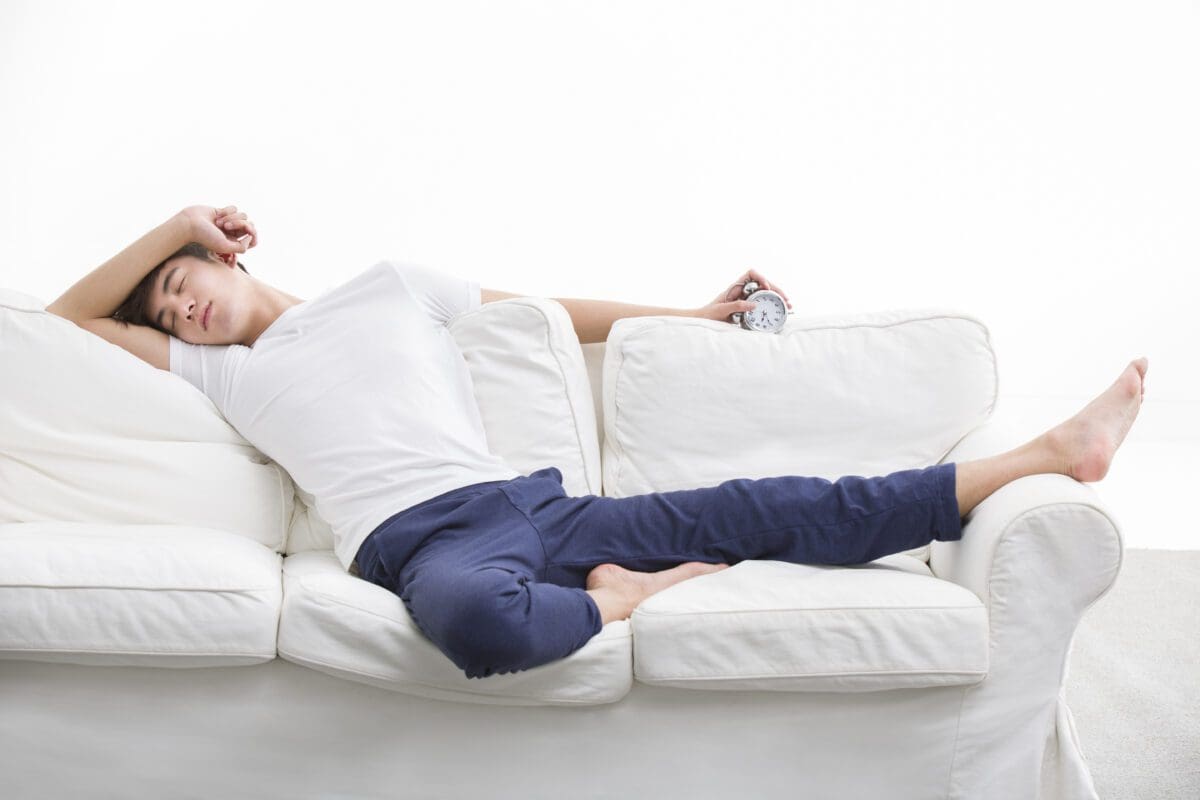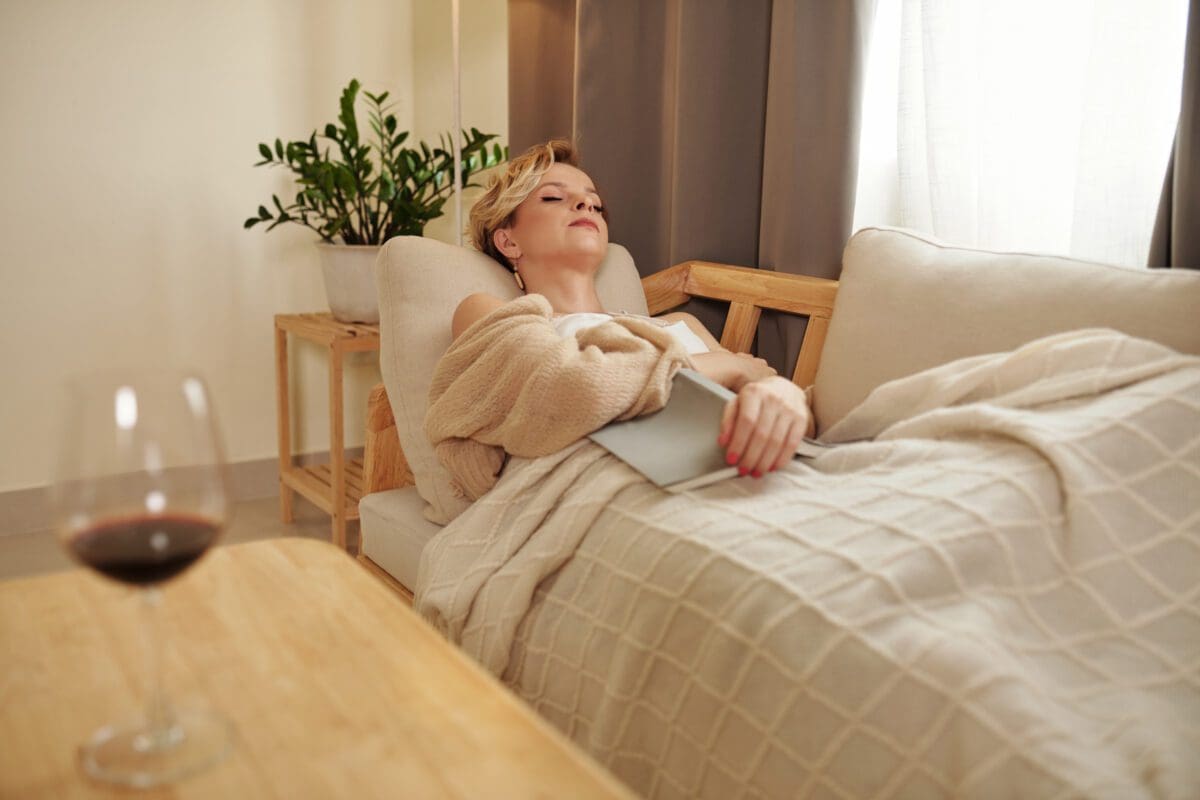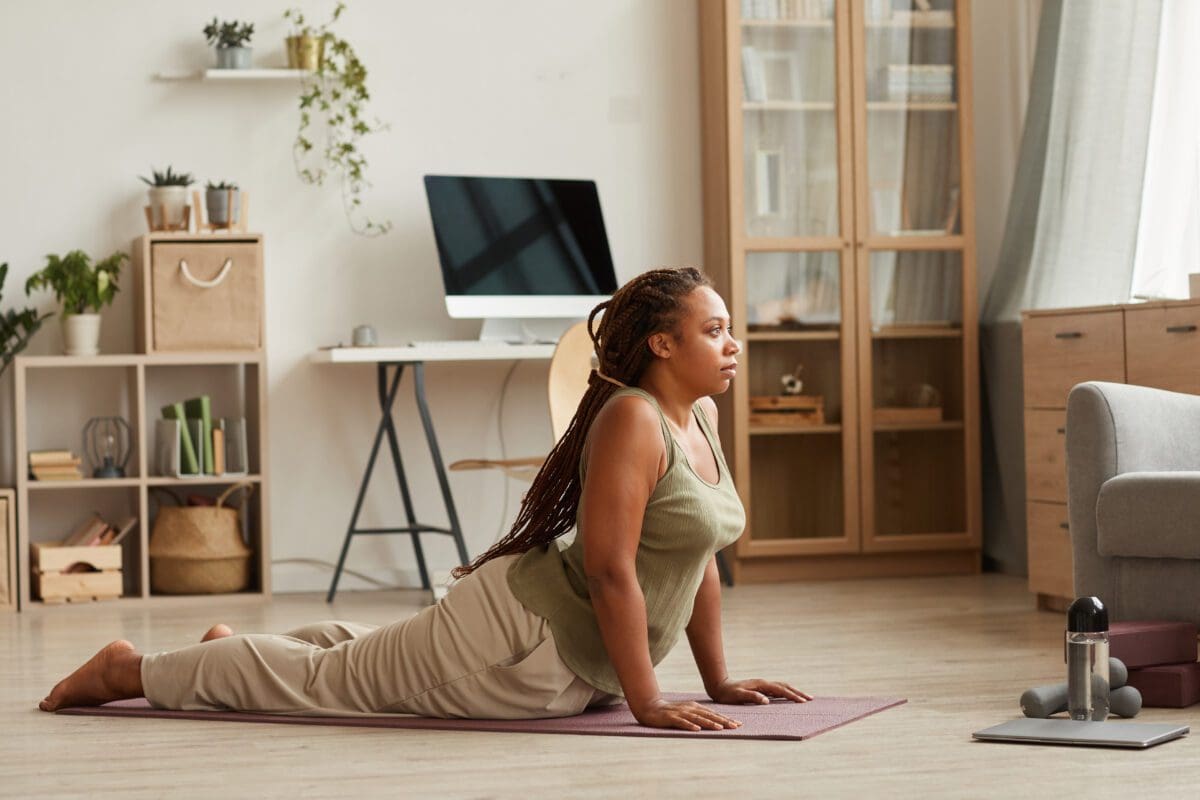You can’t fall asleep in bed? You may find that you fall asleep on the couch when you sit down. You are not alone in wondering “why??” We’ll explore the 5 reasons why you can sleep on the couch but not in bed.
This is due to a number of reasons, but the main one is that the couch provides a more relaxed environment for your brain, which allows it to drift to sleep. It’s a better alternative to going to bed in the bedroom. You’ve probably tried a few remedies to make your bedroom more relaxing and comfortable.
In this article we will discuss the many reasons why the couch is more appealing than the
A 2020 study conducted by the National Sleep Foundation found that about one in five adults (21%) prefers to sleep on a couch rather than in a bed. The number of men sleeping on the couch is higher than that of women.
You may sleep better on a couch for 5 reasons.
Couches can be softer and more supportive, making them better for sleeping. It can be particularly helpful if you suffer from neck pain, stiff hips, or back pain.
Also, they tend to have a lot of cushions which makes it easier to find the right position. The couch is also usually lower than a
It’s not surprising that the bedroom is where people go to sleep after a stressful day at work.
Couches are often associated with activities like reading or watching TV. It can help you to relax and fall asleep. It is so easy to switch into sleep mode.
It’s similar to what was said above, but worth mentioning separately. Our brains begin to associate a location with relaxing activities.
If you use your couch to read or watch TV, your brain may start to associate the couch with relaxation, even when you are not doing anything specific.
It can be difficult to sleep if your bed is too warm or too cold. Your body temperature will rise if your bed is too warm. falling asleep or staying asleep can be difficult. This can lead to excessive sweating, restlessness and feeling tired when you wake up.
Your body temperature will drop if your bed is too cool. It can be difficult to get to sleep and stay asleep. This can cause shivering and cold feelings, as well as a feeling of grogginess when you wake up.
According to the add pillows to your bed to help you find a comfortable sleeping position.
It is essential to have a comfortable bed for a good sleep. Your sleep posture can be affected by an old or uncomfortable
Use pillows to help you create a comfortable position. For example, if you light may interfere with sleep, and can affect the circadian rhythm.
You can prepare for sleep by following a relaxing bedtime ritual. A warm shower or bath can relax your muscles, making it easier to sleep. Listening to soothing music or reading a book can help create a relaxed atmosphere.
Do not use your bed to do anything but sleep and have sex. You can’t watch TV, work, or read in bed. Your brain will start to associate your bed with other activities than sleep when you use it for anything else.
The blue light emitted by TVs and other gadgets can also interfere with sleep cycles.
You should get up and relax until you are tired if you have been tossing in bed for longer than 20 minutes. This will prevent you from associating bedtime with frustration or wakefulness.
The darkness helps promote the production melatonin. Melatonin is a hormone which helps regulate sleep. It’s vital to have a dark and quiet bedroom. Light and noise can disturb sleep. Sleeping at a cool temperature can also be beneficial.
The darkness is necessary for the production melatonin. Melatonin is a hormone which helps regulate sleep. It can be difficult to sleep in a room that is too bright. Use blackout curtains, or an eyemask to block out the light.
It’s also important to ensure that your bedroom is as quiet as possible. Use
Sleeping in a cool environment is ideal. Most people prefer a temperature between 60 and 67 degrees Fahrenheit.
Alcohol and caffeine can disrupt sleep. Alcohol and caffeine can interfere with sleep.
If you want a good sleep, avoid caffeine in the evening and afternoon.
It may initially help you to fall asleep, but later on it can disturb your sleep. Alcohol can make it difficult to get up in the morning.
Exercise can improve the quality of sleep. Avoid exercising too close before bedtime as it can make it hard to fall asleep. Exercise can make you tired and help you fall asleep.
Exercise too close to bedtime can make it hard to fall asleep.
You may need to consult a doctor if you’ve tried the tips above and still have trouble sleeping.
There are at least five reasons why you can’t sleep in bed but can on the couch. One of these could be a medical condition that interferes with your sleep.
You may have issues such as sleep disorder.
I used to have trouble falling asleep in bed. I used to wake up tired and groggy after hours of tossing and turning. I tried every possible thing to help me sleep better, but it didn’t work.
As I sat on the couch watching TV, I felt extremely tired. After laying down, I closed my eyes and fell asleep in minutes. The next morning, I felt refreshed and energized.
I realized I was associating my bed to anxiety and stress. It was difficult for me to sleep when I worried about school or work. When I was lying on the couch I felt relaxed and at ease. I didn’t think about anything and was able fall asleep quickly.
Try sleeping on the couch if you have trouble falling asleep in bed. Change your bedroom at the same time. You might break the spell and go back to bed.
Do you find yourself tossing and turning in bed at night, unable to fall asleep? But then you drift off on the couch as soon as you sit down? You’re not alone, but you may be asking, “why is that?!? Come with us as we explore 5 Reasons Why You Can’t Sleep in Bed But Can on the Couch.
There are a few reasons for this but mainly, the couch is often in a more relaxing environment that allows your brain to drift off to sleep, versus going into than the bedroom. If this is the case for you, then you’ve certainly tried some remedies to make your bed more comfortable and relaxing.
In this article, we’ll discuss all the different reasons why the couch seems to be more appealing than the bed. Additionally, we’ll suggest practical tips to reverse this situation.

According to a 2020 survey by the National Sleep Foundation, about 1 in 5 adults (21%) prefer to sleep on the couch instead of in bed. This number is higher for men (27%) than women (15%).
Here are 5 reasons why you might be sleeping better on the couch:
Couches are often softer and more supportive than beds, which can make them more conducive to sleep. This can be especially helpful if you have neck pain, back pain, or stiff hips.
They also tend to have more cushions, which can help you find a comfortable position. Additionally, the couch is usually lower to the ground than a bed, which can make it easier to get in and out of. This is important if you have mobility issues.
The bedroom is often associated with stress and anxiety, as it’s where we go to work, worry about our day, and think about our problems.
The couch, on the other hand, is often associated with leisure activities, such as watching TV or reading a book. This can create a more relaxed mindset that is conducive to sleep. It’s so easy to shift into sleep mode.
This is similar to the point above, but it’s worth mentioning separately. When we associate a place with relaxing activities, our brains start to think of that place as a place to relax.
So, if you’ve been using your couch to watch TV or read a book, your brain will start to think of the couch as a place to relax, even if you’re not doing anything in particular.
If your bed is too hot or too cold, it can make it difficult to fall asleep. When your bed is too hot, your body temperature rises. This can make it difficult to fall asleep and stay asleep. It can also lead to sweating, restlessness, and waking up feeling tired.
When your bed is too cold, your body temperature drops. This can also make it difficult to fall asleep and stay asleep. It can also lead to shivering, feeling cold, and waking up feeling groggy.
According to the National Sleep Foundation, the ideal temperature for sleep is between 60 and 67 degrees Fahrenheit. If your bed is outside of this range, you may have trouble sleeping.
The couch, on the other hand, is often in a more moderate temperature, which can make it easier to sleep.
If you’ve been having trouble sleeping in bed, it’s possible that your bed has become associated with stress.
This can happen if you’ve been tossing and turning in bed for hours, or if you’ve been using your bed to work or worry about your day. If your bed is associated with stress, it will be harder to fall asleep in it.
Sleeping on the couch regularly always points to a missing feature in the bedroom. Here are some suggestions to make your bed restful, comfortable, and relaxing.
Your mattress should be supportive and not too soft or too hard. You may also want to use pillows to create a comfortable sleeping position.
A comfortable bed is important for getting a good night’s sleep. If your
You may also want to use pillows to create a comfortable sleeping position. For example, if you sleep on your side, you may want to use a pillow between your knees to keep your spine aligned.

This could include taking a warm bath, reading a book, or listening to calming music. Avoid watching TV or using electronic devices in bed, as blue light can interfere with sleep and affect circadian rhythm.
A relaxing bedtime routine can help you wind down and prepare for sleep. Taking a warm bath or shower can help to relax your muscles and make it easier to fall asleep. Reading a book or listening to calming music can also help to create a relaxing atmosphere and a regular sleep schedule.
Don’t use your bed for anything other than sleep and sex. This means no watching TV, working, or reading in bed. When you use your bed for other activities, your brain starts to associate it with those activities instead of sleep.
Also, TV and other gadgets are known to give off too much blue light, which interferes with natural sleep cycles.
If you find yourself tossing and turning in bed for more than 20 minutes, get out of bed and do something relaxing until you feel tired. This will help to prevent you from associating your bed with frustration and wakefulness.
Darkness helps to promote the production of melatonin, a hormone that helps to regulate sleep. Noise and light can disrupt sleep, so it’s important to create a quiet and dark environment in your bedroom. A cool temperature is also ideal for sleep.
Darkness is essential for the production of melatonin, a hormone that helps to regulate sleep. If your bedroom is too bright, it can make it difficult to fall asleep. You may want to use blackout curtains or an eye mask to block out light.
Noise can also disrupt sleep, so it’s important to make sure your bedroom is quiet. You may want to use a white noise machine or
A cool temperature is also ideal for sleep. A temperature of around 60-67 degrees Fahrenheit is ideal for most people.
Caffeine and alcohol can interfere with sleep. Caffeine can make it difficult to fall asleep, and alcohol can disrupt sleep later in the night.
Caffeine is a stimulant that can stay in your system for several hours, so it’s best to avoid it in the afternoon and evening if you want to get a good night’s sleep.
Alcohol may help you fall asleep initially, but it can disrupt sleep later in the night. It can also make it harder to wake up in the morning.

Exercise can help to improve sleep quality. However, avoid exercising too close to bedtime, as this can make it difficult to fall asleep. Exercise can help to tire you out and make it easier to fall asleep.
However, it’s important to avoid exercising too close to bedtime, as this can make it difficult to fall asleep.
If you have tried all of the above tips and you are still having trouble sleeping, you may want to see a doctor.
There at least 5 Reasons Why You Can’t Sleep in Bed But Can on the Couch and one of them may be an underlying medical condition that is interfering with your sleep.
You may have issues such as sleep apnea or restless leg syndrome that you don’t even know about. There are several sleep disorders that can easily be diagnosed and treated at a sleep clinic.
I used to have a lot of trouble sleeping in bed. I would toss and turn for hours, and I would often wake up feeling tired and groggy. I tried everything I could think of to improve my sleep, but nothing seemed to work.
One day, I was watching TV on the couch, and I suddenly felt very tired. I lay down and closed my eyes, and I was asleep within minutes. I woke up the next morning feeling refreshed and energized.
I realized that I had been associating my bed with stress and anxiety. I would often lie in bed worrying about work or school, and this would make it difficult to fall asleep. However, when I was on the couch, I was relaxed and at peace. I wasn’t thinking about anything, and I was able to fall asleep easily.
If you’re having trouble sleeping in bed, try moving to the couch for a few nights. At the same time, make some changes to your bedroom. Maybe that would break the spell, and then you’d go back to your room, and sleep like a baby!